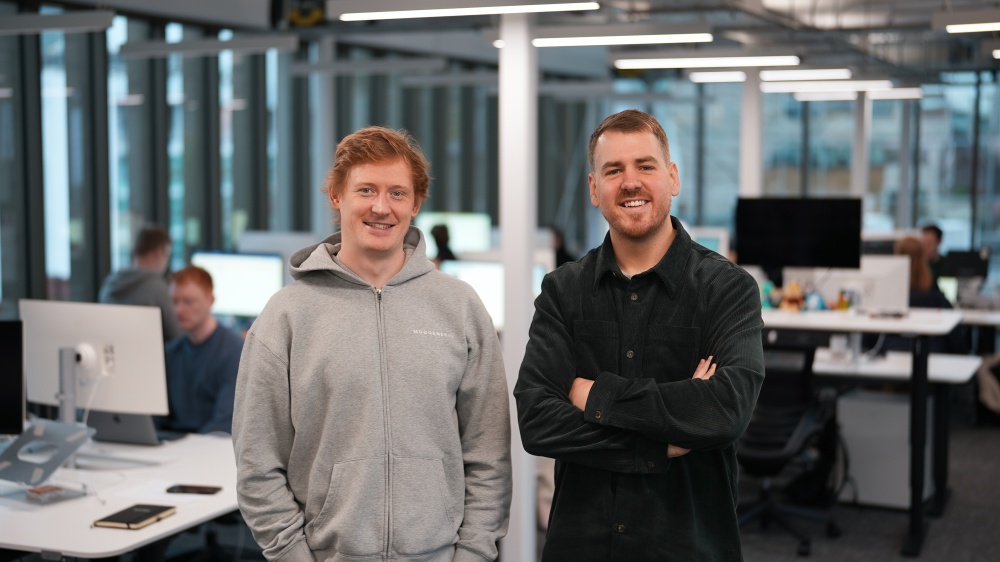For our groundbreaking State of AI report we undertook a unique, company-by-company analysis of AI startups across Europe, and spoke with hundreds of AI entrepreneurs, to deliver unprecedented insight into the European AI ecosystem. We’re excited to share our findings.
AI entrepreneurship is becoming mainstream — one in 12 startups is now an ‘AI startup’. Europe’s 1,600 AI startups — ‘The Disruptors’ — are maturing and bringing creative destruction to new industries, including healthcare, while navigating unique capital dynamics. The UK is the powerhouse of European AI — we provide a functional map of the UK’s 500 AI startups — but Germany and France may extend their influence in the decade ahead. Securing talent, accessing training data and moving from ‘lab to live’ are entrepreneurs’ greatest challenges.
What you need to know:
- AI entrepreneurship is becoming mainstream. In 2013, one in 50 new startups embraced AI. Today, one in 12 put it at the heart of their value proposition. Today, Europe is home to 1,600 early stage AI software companies.
- The European start-up ecosystem is maturing. One in six European AI companies is a ‘growth’-stage company with over $8m of funding. Expect: acquisitions to recycle capital and talent; startups competing with ‘scale-ups’ as well as incumbents; and increasing competition for talent.
- The UK is the powerhouse of European AI with nearly 500 AI startups — a third of Europe’s total and twice as many as any other country. We provide a functional map of the UK’s AI startups.
- Germany and France are thriving European AI hubs. High-quality talent, increasing investment and a growing roster of breakout AI companies are creating feedback loops of growth and investment.
- Spain’s contribution to European AI exceeds its size. Immigration, which correlates with entrepreneurship, has deepened the Country’s talent pool.
- The European AI landscape is in flux. While the UK remains the powerhouse of European AI, its share of European AI startups, by volume, has slightly reduced. Brexit could accelerate this. France, Germany and other countries may extend their influence in the decade ahead, spreading the benefits of entrepreneurship more evenly across Europe.
- Italy, Sweden and Germany ‘punch above their weight’ in core AI technology, while there is support for Nordic countries’ reputation for deep tech expertise.
- Nine in ten AI startups address a business function or sector (‘vertical’). Just one in ten provides a ‘horizontal’ AI technology.
- A quarter of new AI startups are consumer companies, as entrepreneurs address or circumvent the ‘cold start’ data challenge. Many focus on finance or health & wellbeing.
- Healthcare, financial services, retail and media & entertainment are well served by AI startups. In sectors including manufacturing and agriculture, entrepreneurial activity is modest relative to market opportunities.
- Health & wellbeing is a focal point for AI entrepreneurship; more startups focus on the sector than any other. In the coming decade, developers will have a greater impact on the future of healthcare than doctors. Activity is thriving given profound new opportunities for process automation and a tipping point in stakeholders’ openness to innovation.
- The UK is the heartland of European healthcare AI, with a third of the Continent’s startups. UK entrepreneurs benefit from healthcare scale-ups stimulating talent and increasing openness to innovation within the NHS.
- Marketing and customer service departments enjoy a rich ecosystem of suppliers. A quarter of AI startups serving a business function focus on marketing teams.
- An influx of AI startups supporting operations teams is driving increasing process automation.
- AI companies raise larger amounts of capital, due to technology fundamentals and extensive capital supply.
- Core technology providers attract a disproportionate share of funding. While comprising a tenth of AI startups, they attract a fifth of venture capital.
- AI entrepreneurs’ key challenges are the availability of talent, access to training data and the difficulty of creating production-ready technology.
1. Europe is home to 1,600 early stage AI software companies
With every paradigm shift in technology, innovative early stage companies emerge to improve and then reimagine business processes and consumer applications. Over time, the distinction between ‘AI companies’ and other
software providers will blur and then disappear, as AI becomes pervasive. Today, however, it is possible to highlight a sub-set of early stage software companies that have AI at the heart of their value proposition.
We individually reviewed the activities, focus and funding of 2,830 startups classified by popular industry tools as AI startups in the 13 EU countries most active in AI — Austria, Denmark, Finland, France, Germany, Ireland, Italy, the Netherlands, Norway, Portugal, Spain, Sweden and the United Kingdom. Together, these countries also comprise nearly 90% of EU GDP.
In approximately 60% of the cases — 1,580 companies — there was evidence of AI material to a company’s value proposition. Further analysis of these nearly 1,600 AI startups — ‘The Disruptors’ — revealed the dynamics of the startups driving the paradigm shift to AI.
2. AI entrepreneurship is becoming mainstream
In 2013, just one in 50 new startups embraced AI. Today, one in 12 put AI at the heart of their value proposition. In 2019, entrepreneurs are disrupting incumbents by leading the paradigm shift to AI.
Fig. 1: Today, one in 12 startups put AI at the heart of their value proposition
AI-led startups have proliferated since 2016, as technological enablers for AI meet triggers for entrepreneurship. Maturing AI enablers included: enhanced algorithms offering improved results; specialised hardware that accelerated AI system training; and greater availability of training data.
Against this background, more entrepreneurs are taking advantage of AI as: cloud-based AI infrastructure and open source AI frameworks reduce initiation and scaling costs; startups successfully access pools of AI talent at leading universities; venture capital funding for European AI startups has increased as providers of capital recognise opportunity for returns; and successful AI exits (Blue Vision Labs, Deep Mind, MagicPony, SwiftKey) and scale-ups (including Ada Health, Babylon Health, Benevolent AI, Darktrace, Graphcore, Kreditech and Meero) highlight demand and recycle capital and leadership experience within the European ecosystem.
Within ten years, most companies will use AI in select business processes, either directly or via their suppliers. Widespread adoption of AI among today’s entrepreneurs is a leading indicator of a near-term future in which AI is pervasive.
For incumbents, the growth of AI entrepreneurship is a double-edged sword. AI startups are valuable suppliers an — ‘on-ramp’ to AI — for companies that embrace them, while disrupting those that do not. Select early stage companies will be acquired by today’s incumbents or become the incumbents of tomorrow.
3. The European AI ecosystem is maturing
While AI entrepreneurship is nascent (six in ten AI startups in Europe are at the earliest stages of their journey, with Angel or Seed-stage funding), it is maturing. One in six European AI companies has passed through Angel, Seed and Early Stage phases to a ‘Growth’ phase, catalysed with over $8m each in venture funding.
Countries with a large number of AI companies (the UK, France and Germany) typically have more mature ecosystems. In the UK, France and Germany, one in five AI startups are later, ‘Growth’-stage companies; in Sweden, just one in ten. Spain is an exception. While there are almost as many AI companies in Spain as in Germany, just one in ten is mature.

Fig 2: Six in ten AI startups are Angel- or Seed-stage companies

Fig. 3: Larger AI ecosystems are typically more mature
As the ecosystem matures, we expect:
- an increasing number of exits, as incumbents acquire disruptive, early stage companies gaining critical mass;
- a positive, ‘flywheel’ effect as lucrative exits recycle capital and talent within the ecosystem;
- selective, high-profile failures among companies that have raised significant sums of capital;
- startups competing with ‘scale-ups’ as well as incumbents;
- increasing competition for technical talent and executive leadership, as ‘scale-ups’ offer attractive salaries and impact as well as innovation;
- the European AI sector to better compete with larger US vendors as, to an increasing extent, multinational companies procure vendors internationally.
4. The UK is the powerhouse of European AI
Source: MMC, Beauhurst, Crunchbase, Tracxn
With the largest internet economy in the G20, extensive academic talent including a quarter of the world’s top 25 universities, a growing number of AI exits (DeepMind, SwiftKey, MagicPony) recycling capital and talent, supportive Government policy in relation to AI, and a global financial services hub, the UK has significant assets.
Our market map, below, places the UK’s 500 startups according to:
- Purpose: Does the company focus on a business function (for example, marketing or human resources), a sector (healthcare, education) or core AI technology with cross-domain application?
- Customer: Does the business predominantly sell to other businesses (B2B) or to consumers (B2C)?
- Funding: How much funding has the company disclosed to date? We categorise companies as: Angel or Seed stage (under $500,000 to $2m); or Early or Growth stage (over $2m to c. $200m).
With approximately 200 AI startups each, Germany and France are thriving AI hubs in Europe. High quality talent, increasing volumes of capital and an expanding roster of successful AI companies are creating feedback loops of growth and investment.
Spain is an outlier whose contribution to European AI exceeds its size. Despite a population half the size of Germany, Spain houses almost as many AI startups. Extensive immigration may have deepened the Country’s already broad pool of talent. Spain has the second highest rate of immigration in the EU, and entrepreneurial activity is higher among immigrants than native citizens (Global Entrepreneurship Monitor).
5. Germany and France are extending their influence
The dynamics of AI entrepreneurship in Europe are in flux. While the UK remains the powerhouse of European AI, and will house more AI startups than other European countries for years to come, its share of European AI startups, by volume, has slightly reduced.
Brexit could accelerate this dynamic. AI developers are skilled, few in number and may select opportunities from the many offers they receive. More broadly, one in five London technology workers is an EU national from overseas (London Tech Advocates). If free movement of workers between the EU and UK ends, visas are unforthcoming, or rhetoric is unwelcoming, the UK’s access to talent could reduce. France, Germany and other countries may extend their influence in the decade ahead, spreading the benefits of entrepreneurship more evenly across Europe.
Fig. 6: France and Germany have increased their share of Europe’s AI startups (Source: MMC, Beauhurst, Crunchbase, Tracxn)
6. Italy, Sweden and Germany ‘punch above their weight’ in core technology
While two thirds of Europe’s core technology AI startups are located in the UK, Germany, Spain and France, adjusting for countries’ ‘size’ — their number of AI startups — reveals a different dynamic.
Relative to their size, Italy, Sweden and Germany are core technology hubs; in each, approximately one in five AI startups is a core technology provider compared with the European average of one in eight.
There is also support for Nordic countries’ reputation for deep tech expertise; in Finland, Denmark and Norway one in seven AI startups is a vendor of ‘core’ AI technology.
Fig. 7: Source: MMC, Beauhurst, Crunchbase, Tracxn
While countries with large AI ecosystems, such as the UK, benefit from a large number of leading universities, broad pools of talent and extensive investment, smaller hubs ‘punch above their weight’ for varying reasons. In addition to exceptional talent, their ecosystems benefit from: leading research and engineering centres (Germany); effective core technology incubators (Finland); the AI laboratories of internet giants (Paris); and the ‘halo’ effect of multiple successful scale-ups in other fields (Sweden). Flows of venture capital into smaller core technology hubs are also increasing, creating a virtuous circle of investment and success.
Don’t miss Part 2 of our analysis, when we reveal how:
- Health & wellbeing has become the focal point for AI entrepreneurship;
- An influx of AI for operations teams is driving increasing process automation;
- AI companies raise larger amounts of capital at higher valuations;
- AI entrepreneurs’ key challenges are talent, data and moving from ‘lab to live’;
…and more.
This post originally appeared on MMC Writes.











